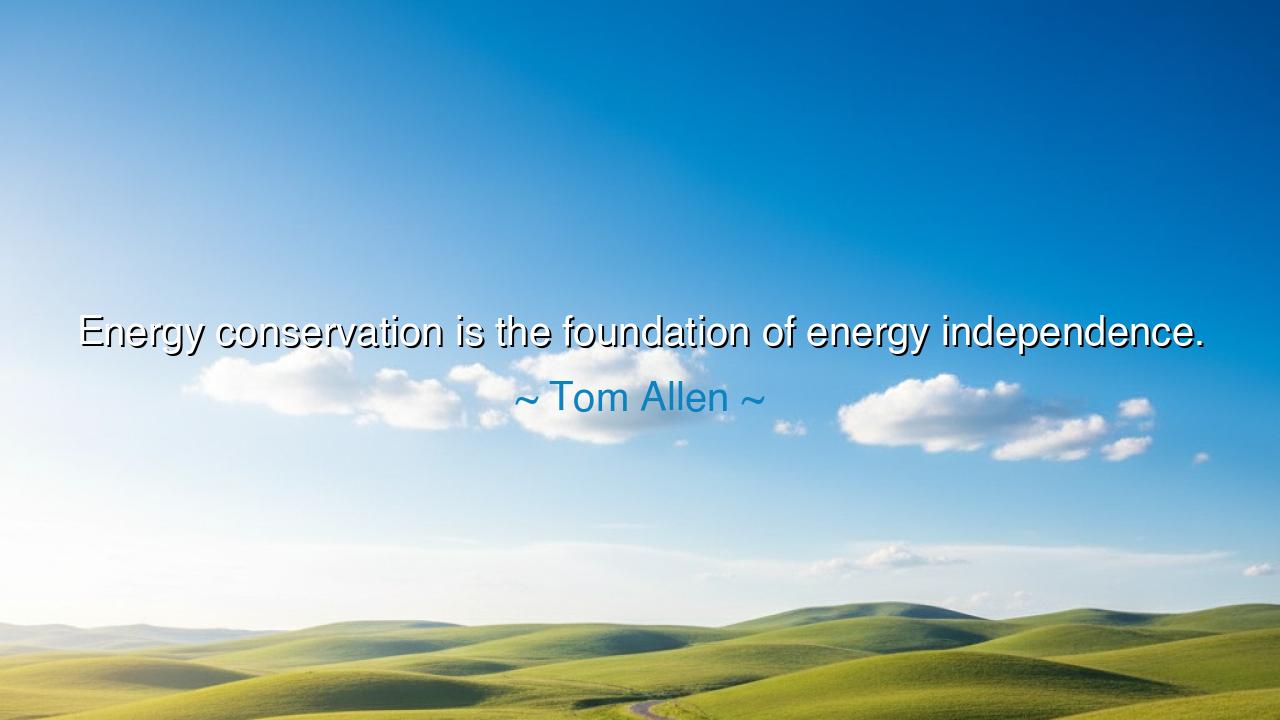
Energy conservation is the foundation of energy independence.






The words of Tom Allen, simple yet profound, strike like the steady pulse of truth beneath the noise of modern life. When he declared, “Energy conservation is the foundation of energy independence,” he was not merely offering a policy or a slogan—he was speaking a principle as old as civilization itself. His statement is a call to wisdom in an age of excess, a reminder that true power begins not in accumulation, but in restraint. For the one who knows how to preserve what they have will never be ruled by what they lack.
To understand his words, we must look to their origin. Tom Allen, a statesman from the United States, spoke during a time when nations were awakening to their dependence on foreign energy. Oil crises, rising prices, and political instability had revealed a sobering truth: a country that cannot control its own consumption cannot control its own destiny. In this age, the quest for energy independence became a rallying cry. Yet Allen, with a clarity rare among leaders, saw that independence could not be purchased through drilling alone or secured by conquest abroad. It must begin at home, within the habits of a people—through conservation, discipline, and respect for the limited gifts of the Earth.
His insight echoes the wisdom of the ancients, who understood that freedom is rooted in self-mastery. Just as a person who squanders their wealth becomes a slave to debt, a nation that wastes its resources becomes a servant to others. The wise farmer does not exhaust his soil, nor does the wise ruler consume without thought for tomorrow. Allen’s words remind us that the true measure of a civilization is not how much it can produce, but how well it can preserve. Conservation, then, is not a denial of progress—it is its foundation, the unseen strength that sustains generations.
Consider the story of the oil crisis of 1973, when the world’s great powers were brought to their knees by scarcity. When foreign suppliers cut off the flow of oil, lines of cars stretched for miles, factories slowed, and homes went cold. Suddenly, nations that had grown accustomed to abundance faced the fragility of their dependence. But out of this trial came renewal: innovations in fuel efficiency, the birth of renewable energy movements, and a new consciousness about waste. It was a painful lesson, yet one that proved Allen’s wisdom—that the path to security lies not in endless supply, but in mindful use. The nations that learned to conserve emerged stronger and more resilient; those that did not remained chained to the whims of others.
In the voice of the ancients, we may say: the flame that burns wisely endures; the flame that consumes recklessly dies in its own hunger. Energy is the fire of the modern world—it warms our homes, powers our cities, and fuels our dreams. But when fire is ungoverned, it devours the very things it was meant to serve. Energy independence, then, is not a conquest of nature, but a covenant with it. To conserve is to show reverence, to remember that every spark comes from a source that must be honored, not exploited. Allen’s words call us back to balance, to humility before the forces that sustain our lives.
His message is not only for nations, but for each individual. Every home, every household, every heart carries the same law. When we waste our energy—whether in the form of electricity, or effort, or attention—we surrender our freedom to the systems that feed our appetite. When we conserve, we reclaim our sovereignty. A person who lives simply and wisely is never poor; a nation that lives within its means is never weak. Thus, conservation is not deprivation—it is strength refined by wisdom.
Let this lesson be inscribed in the hearts of those who would live freely: discipline is the path to independence. The one who guards their energy, whether of body, mind, or nation, will stand unshaken when others fall. Let us remember the teaching of Tom Allen, and see energy conservation not as a burden, but as a noble duty—a modern act of stewardship in the lineage of ancient virtue.
The practical path is this: use less, but value more. Turn off what is idle, repair what is broken, cherish what still serves. Support the energy that renews rather than depletes, and teach the young that waste is the enemy of freedom. For if each person tends to their own flame with care, the light of nations will never dim. Energy independence begins not in the mines or the markets, but in the choices of every soul who knows that freedom, once earned, must be sustained by wisdom.






AAdministratorAdministrator
Welcome, honored guests. Please leave a comment, we will respond soon